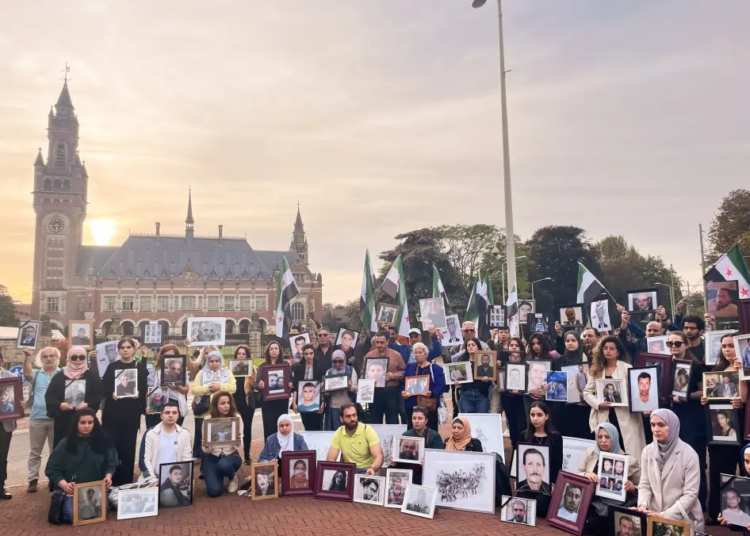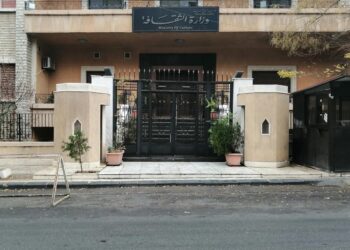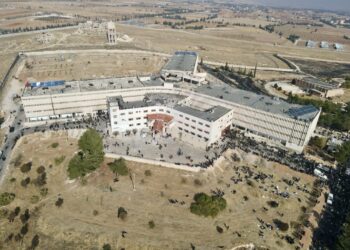- Introduction:
The conviction of Syrian physician Alaa M. by the Higher Regional Court in Frankfurt is more than just an exceptional case of accountability for horrific crimes; it represents a significant judicial achievement that goes beyond the scope of an individual case. After three and a half years of proceedings, which culminated in his life sentence for war crimes and crimes against humanity, this trial marks a milestone in the path of justice, not only in terms of its punishment, but also in the possibilities it offers for shaping the structure of transitional justice in Syria after the fall of the Assad regime.
The timing of this ruling and the anticipated political transformation in Syria provides a unique opportunity to transfer and localize legal expertise. Although universal jurisdiction trials were, until recently, the only means of holding perpetrators of state-sponsored crimes accountable in Syria, they now serve as models for building domestic accountability mechanisms. By documenting systematic torture in military hospitals, establishing command structures, and identifying crimes against humanity in the Syrian context, the Frankfurt Tribunal has laid important jurisprudential foundations for future Syrian courts.
This article examines how the procedural, evidentiary, and substantive dimensions of Alaa M.’s trial can be used to support Syria’s transition from external justice mechanisms to internal justice processes.
- Universal Jurisdiction as a Bridge to National Accountability:
The principle of universal jurisdiction, on which the Frankfurt Court relied in the trial of Alaa M., constitutes a temporary tool for justice that does not negate Syrian sovereignty. According to the principle of complementarity, a cornerstone of international criminal law, national courts are given priority in prosecutions, and international or extraterritorial mechanisms intervene only when states are unable or unwilling to do so. In the Syrian case, the systematic nature of the violence perpetrated by the Assad regime has prevented any domestic justice, necessitating recourse to universal judicial mechanisms.
But these cross-border trials are not only concerned with direct accountability; they also play an important role in preserving evidence and building legal frameworks for the future. Through the testimonies of more than fifty witnesses and the analysis of experts on torture methodologies and command structures, mass graves and the Caesar photos, and may other evidence, the Frankfurt court documented a meticulous archive that could have been lost or destroyed in an unstable environment. Its findings on the transformation of military hospitals into torture sites, the systematic nature of attacks on civilians, and the role of the security services constitute judicial narratives that could later be adopted by the Syrian judiciary through legal notices or references.
Transitioning from an authoritarian regime where justice is impossible to achieve to a post-conflict context requires a systematic shift from reliance on external justice to establishing national processes based on the rule of law.
Universal jurisdiction rulings should not be viewed as an external legal imposition, but rather as foundational precedents that can be used to formulate domestic prosecution methodologies, define standards of proof, and develop a specialized legal understanding of atrocity crimes. The Frankfurt Trial provides a model for analyzing mass crimes and deconstructing them into individual, justiciable acts, while preserving their methodological distinctiveness.
This shift does not mean translating foreign rulings verbatim, but rather requires integrating them into a sovereign framework that reflects Syrian legal specificities and adheres to international standards. In this sense, universal jurisdiction cases serve as a temporary bridge between the reality of institutional incapacity and the fate of judicial sovereignty, providing Syria with the tools and methods to restore justice domestically.
- Standards of Evidence and Judicial Documentation Methodologies
The Frankfurt trial, which spanned 186 days, exemplified the high level of documentation required to prosecute mass atrocity crimes, setting evidentiary standards that go beyond traditional criminal practice. This extended timeframe enabled the systematic compilation of diverse sources of evidence, creating a factual matrix that documents individual criminal acts within their systemic context. The length of the proceedings reflects not bureaucratic slowness, but the complexity of the task of establishing criminal responsibility within an organized pattern of state-sponsored violence, which requires aligning individual facts with the widespread attacks against civilians.
The court’s use of multiple evidentiary methods reflects the complex nature of prosecuting perpetrators of atrocity crimes. More than 50 witnesses provided firsthand accounts of torture, sexual violence, and killings in military hospitals, while experts contextualized these testimonies within the Syrian intelligence and military command system. The integration of survivor testimonies, forensic analysis, and written documents helped forge coherent legal patterns from scattered individual experiences. This methodological triangulation is all the more important in the face of crimes designed to erase traces, where perpetrators deliberately destroy documents and intimidate witnesses.
Uncovering chains of command within closed security structures required innovative approaches to handling circumstantial evidence and identifying recurring patterns. The court demonstrated an ability to connect Alaa M.’s actions to broader institutional policies, establishing his responsibility within a framework of organized violence. By mapping the operational structures of Military Hospitals 601 and 608, and Branch 261 of the Military Intelligence Directorate, the trial revealed how medical institutions were systematically repurposed as torture centers, transforming hospital facilities into instruments of systematic violence.
The Syrian Network for Human Rights (SNHR) and the European Center for Constitutional and Human Rights (ECCHR) played a significant role in connecting crime scenes to courtrooms. Their contributions included providing documentation, identifying witnesses, and providing contextual analysis that supported the prosecution’s work, underscoring the pivotal role of civil society organizations as intermediaries in accountability processes. SNHR’s systematic documentation over fourteen years has provided temporal continuity for the preservation of evidence, while the ECCHR’s expertise has transformed raw documents into litigable files. This collaborative model, in which human rights organizations act as evidence custodians and legal facilitators, offers a replicable model that can be adopted in future Syrian judicial proceedings.
- Institutional Reform Based on Legal Precedents
Incorporating international crimes into Syrian domestic law poses a profound challenge that goes beyond mere legislative amendment. The Frankfurt Court, through its precise definition of crimes against humanity and war crimes in the Alaa M. case, has provided a jurisprudential model upon which to build. However, reforming the Syrian legal system requires bridging the gap between international definitions and national judicial traditions. The inadequacy of the current Syrian penal code to address systematic state-sponsored violence highlights the need for a comprehensive review, which would involve either drafting new legislation or developing transitional legal frameworks that explicitly criminalize international crimes, in accordance with internationally recognized customary standards.
Judicial independence is a prerequisite for credible trials for those who have committed serious crimes. This requires structural reforms that go beyond the superficial aspects of judicial institutions. Syrian judicial reform must address two complementary dimensions: formal independence through constitutional guarantees, the stability of judicial functions, and the provision of resources, along with substantive independence through the promotion of a judicial culture that resists political interference and upholds legal integrity. Effective accountability for state criminals is inconceivable without a free judiciary capable of holding accountable the security and military structures that have long enjoyed impunity under Assad.
Security sector reform, grounded in the principles of accountability, is a fundamental step in the engineering of transitional justice. Security agencies should not be viewed solely as tools for restructuring, but rather as sites that must be held accountable and participate in uncovering the truth. The case of Alaa M., in which military hospitals were transformed into torture centers, highlights the need to dismantle the institutional culture that legitimized violence.
Reform must not be limited to replacing personnel or reshaping structures; it requires establishing new doctrinal frameworks that integrate human rights principles into daily operational practices.
This practical approach involves establishing effective internal accountability mechanisms, such as inspector general offices with genuine investigative powers, mandatory human rights training within professional development programs, and clear criteria for holding commanders accountable for violations within their jurisdiction. This model recognizes that radical reform is not achieved solely through external oversight, but rather by instilling a culture of accountability within institutions founded on the logic of repression. Holding medical professionals accountable for violating their ethical duties establishes a crucial principle: that professional obligations cannot be subordinated to the imperatives of the security state, a principle that must apply to all sectors involved in the system of systematic violence.
- Establishing a Transitional Justice Architecture
Transitional justice in the Syrian context requires a shift from ad hoc approaches to accountability to the development of an integrated system that addresses the structures that produced atrocities, rather than simply punishing individual perpetrators. The Frankfurt Tribunal’s findings, which revealed the systematic transformation of medical facilities into torture centers, demonstrate the extent to which entire institutional frameworks are implicated in the practice of violence. This calls for accountability mechanisms that address these structural structures while preserving the precision of individual criminal responsibility. Hence, Syrian transitional justice must develop strategies that link individual cases with collective patterns, establishing legal narratives that reflect the systemic nature of the crime without nullifying individual responsibility.
Fact-finding mechanisms are a fundamental complement to criminal trials, allowing us to understand the social and political dimensions that paved the way for crimes. While judicial proceedings focus on determining individual responsibilities within a legal framework, truth commissions enable us to explore broader contexts, including the ideological frameworks that legitimized violence and the bureaucratic structures that institutionalized it. This integration between the two processes serves distinct but complementary functions: the judiciary establishes legal accountability, while truth-finding reconstructs historical narratives and paves the way for long-term institutional reform.
On the other hand, transitional justice requires a victim-centered approach that moves beyond traditional models of retribution toward a model that recognizes victims’ rights as active participants in the design of justice. The experience of the joint plaintiffs in the Alaa M. case, represented through European judicial mechanisms, highlighted the possibilities and challenges of victim participation. To ensure the inclusiveness of this participation, victims must be recognized as rights holders demanding reparation, participation, and the preservation of memory, not merely as witnesses.
This requires establishing institutional structures that enable victims to express their demands, contribute to the design of accountability mechanisms, and develop compensation programs that address both material and moral damages. Justice processes should contribute to the rehabilitation of survivors, not the re-enactment of their trauma. The challenge remains in striking a delicate balance between individual responses to attacks and recognizing the collective wounds left by systematic violence. To achieve this, institutional innovations must be adopted, such as victim support units within public prosecution offices, psychosocial support programs that accompany legal proceedings, and participatory mechanisms that enable victims to shape the transitional justice agenda, going beyond their role as mere providers of evidence.
- International Legal Integration and Judicial Capacity Building
Syria’s membership in the Rome Statute after the transitional period is a strategic step toward consolidating judicial legitimacy and building institutional capacity. This accession provides access to ICC jurisprudence, procedural guidelines, training and capacity-building programs, and entrenches adherence to international legal standards. The Frankfurt v. Alaa M. trial established evidentiary and procedural standards that serve as a benchmark for the level Syrian courts should reach to meet complementarity requirements, preventing ICC interference while benefiting from its institutional expertise.
However, the implementation of international jurisprudence requires a thoughtful translation between legal frameworks and local political and social contexts. The ruling in the Alaa M. case, along with other cases heard under universal jurisdiction, provides jurisprudential precedents that can be relied upon to interpret crimes against humanity in the Syrian context. However, uncritical reliance on foreign rulings may lead to legal inconsistencies or popular and political rejection. Therefore, Syrian jurists should develop selective methodologies based on the persuasive value of international precedents, while extracting principles that can be adapted locally. This requires examining how international courts have dealt with similar issues, such as proving the systematic nature of attacks on civilians, command responsibility in closed security agencies, or distinguishing between legitimate military operations and acts of criminal violence.
Building judicial and prosecutorial expertise requires structured mechanisms for knowledge transfer that go beyond traditional training models. The Frankfurt trial revealed the complexity of atrocity prosecutions, which lasted 186 days and involved specialized experts and advanced evidence management. Therefore, capacity building should encompass multiple areas: international crimes jurisprudence, complex trial management, witness protection, and criminal and forensic skills. Exchange programs that allow Syrian professionals to observe international trials, mentoring relationships with international prosecutors, and joint case-building exercises can accelerate the development of judicial competence. The experience of SNHR and ECCHR in the case of Alaa M. demonstrates the potential of civil society organizations to act as knowledge bridges, linking international standards with the Syrian context, and offering methodologies that can be internalized and localized within Syrian institutions.
- Conclusion
The verdict against Alaa M. represents the fruit of sustained efforts by survivors, human rights organizations, and international legal mechanisms to break the wall of impunity that has long accompanied the Assad regime’s violence. It also provides a solid legal foundation upon which Syria can build to establish a national accountability system, transforming reliance on foreign courts into an autonomous capacity based on sovereignty and justice.
But this transition from external to internal justice mechanisms is not achieved solely by restructuring institutions; it requires redefining the relationship between state authority and the rule of law. The Frankfurt trial demonstrated that systematic violence can be decomposed into accountable acts, that doctors and other actors cannot invoke superior orders to justify their violation of professional duties, and that documented evidence can withstand deliberate attempts at erasure.
The evidentiary and procedural standards established by the Frankfurt Court, the partnerships formed between civil society and judicial institutions, and victim-centered approaches all provide proven tools that can be adapted to the Syrian context. However, institutionalization goes beyond the mere transfer of technologies; it requires establishing a new legal culture based on accountability, building sustainable funding mechanisms for complex prosecutions, and establishing protection systems that preserve the independence of justice in the face of political pressure.
At this pivotal moment in Syria’s history, Alaa M.’s ruling marks the beginning of a new phase. It promises to establish standards and methodologies that can guide transitional justice from the outside in, to be formulated within Syrian institutions, by its legal experts, and for the recovery of its society.






